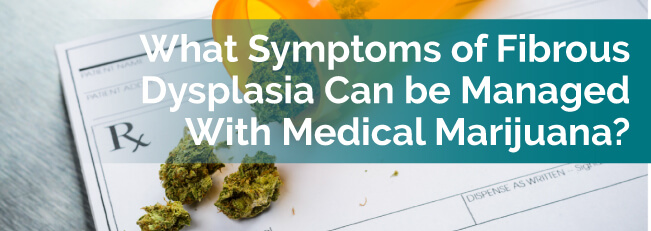
Some cases of fibrous dysplasia are so mild that they go unnoticed. But for patients suffering from severe forms of the disorder, quality of life can be harmfully impacted. The condition is caused by a gene mutation that affects the bones on a cellular level. Fibrous connective tissues replace normal, healthy bones, leaving them weak and susceptible to fractures and deformities.
Fibrous dysplasia usually affects only a solitary bone, making it monostotic. However, rarely, multiple bones are impacted by the disorder, called polyostotic. These issues occur most commonly in long bones like the femur, humerus or tibia, but can also cause facial asymmetry by impacting the skull or facial bones. The condition causes extreme bone pain in many patients.
Medical marijuana is legalized in states throughout the U.S. for conditions that cause chronic pain, like fibrous dysplasia. Not only do its analgesic properties help patients manage their pain, but it’s beneficial to some of the other symptoms associated with the disease.
There is no cure for fibrous dysplasia, and there are limited treatment options, including:
For years, people have focused on marijuana’s psychotropic side effects. However, they neglected to ask the question — why is our body impacted so strongly by cannabis? Now that medical marijuana has been legalized in many states, researchers in the medical field are taking a closer look.
The effectiveness of marijuana is the result of its interaction with the body’s endocannabinoid system (ECS). The ECS is a series of receptors that bring balance to many different bodily systems and functions. Pain management, digestion, motor function and emotional health are all kept in check by the ECS.
When disease or disorders affect our bodies, they can also cause the endocannabinoid system to be out of balance. The cannabinoids in marijuana are compounds that give the plant its health benefits — they also bind to ECS receptors and mimic our bodies own natural cannabinoids, which is why THC and CBD have such amazing medicinal properties.
Because medical marijuana works with our body’s endocannabinoid system, it has the potential to treat several different symptoms associated with fibrous dysplasia. Currently, patients seek cannabis treatments for the following symptoms:
It’s believed that medical marijuana could aid other symptoms associated with fibrous dysplasia by promoting bone health. However, more research is required.
If you’re struggling with symptoms associated with fibrous dysplasia and believe cannabis could be a positive treatment option for you, contact your doctor. All medical treatments should only be pursued under their care, and our advice shouldn’t replace theirs. Reach out to a doctor near you or contact a medical marijuana dispensary for specific marijuana-related questions.
For more information about how cannabis can be used to treat Fibrous Dysplasia, check out our resources: